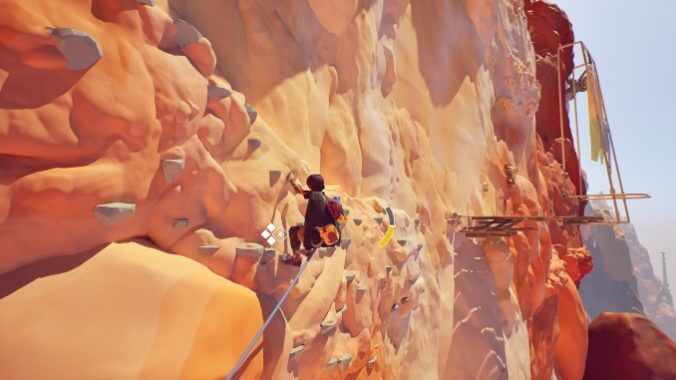It would be a disservice to suggest that all you do in Jusant is climb. It is the thing that you do, alongside unearthing the stories of the mountain folk before you and their cultural touchstones, but it’s hardly as simple as it sounds. Jusant cuts out much of the noise of modern games and turns its central mechanic into a singular experience a cut above the rest. It reminds me that games can take any shape, and they’re often better the more diverse and distinct that shape is.
Don’t Nod, the developers behind Jusant, are no strangers to alternative approaches. Hitting big with Life is Strange back in 2015, the studio has always looked for distinct ways to tell stories in games. In their earliest work, this consisted of takes on the adventure genre that asked what you would do if your choices weren’t actually permanent, and you could travel through time. While they toyed around with the potential of the burgeoning Life is Strange series and similar adventure titles, they also branched out into games like Vampyr, a title about a doctor-turned-vampire that interestingly wrestles with morality via the Hippocratic Oath and progression systems. Time and time again, the studio and its games have exemplified the effort to eschew the norm and tell stories of different sizes and shapes. Then this year it delivered Jusant, the game that has most perfectly encapsulated that ethos in my eyes.
In Jusant there are no enemies, and there’s certainly nothing resembling combat. There’s no plot filled with antagonists to oppose your player character. Consequently, there’s no dialogue and precious few characters to share a screen with. There’s no progression systems either, meaning that you are by and large the exact same character with the exact same capabilities for the entirety of your adventure, with the exception of chapter-based mechanics that are later introduced. What I’ve effectively described is a game bereft of most of the features a modern audience expects from the average game. In the absence of any and all of these systems, Jusant comes to life in an entirely different way though.
Jusant opens itself up to be a wholly different kind of expression than many other games; it feels like a full body experience. The triggers, which in any other game are defined by verbs like “punch” or “aim” or “shoot,” instead control the grip of your corresponding hands. As you scale the mountain at the heart of Jusant, inputs on the analog sticks don’t simply direct your movement—they dictate where your hands are reaching out to. Climbing isn’t as simple as pressing forward on a vertical surface, it’s rhythmic and full of split-second decision making. Press on one trigger to grasp a handhold while your free hand seeks another, clings to it, and frees the former hand and trigger. I found before long that this rhythm entranced me, blurring the lines between realities in my head as I squeezed the triggers for dear life, wholly believing I’d actually plummet from the couch in my Brooklyn living room if I let go at the wrong time.
Our synergy didn’t stop there either. You know how sometimes you’ll play a tense game, need to peek around a corner, and accidentally crane your neck around the TV mimicking the character? I had a similar experience the entirety of my time playing Jusant. Lunging from one handhold to another, I reflexively found myself pulling back and then jumping forward in my seat. In one of the later chapters, one particularly long, beautiful and harsh climb basically left me winded, though the reality was that the palpable tension of the sequence subconsciously made me hold my breath until I hit a checkpoint.
And at the end of it all, Jusant actually brought me some peace of mind. Some zen that I can hold onto or reflect on. It might’ve even turned me onto a new hobby. That’s not something I can often say about a field populated by typically violent and extraneous fantasies. I don’t think that I made an emotional connection to the character of Jusant. He’s a neat kid and I love the adorable little creature he’s ferrying up the mountain, but I didn’t really get to know him in a greater sense. Nonetheless, I made an entirely different kind of connection, one that feels much more spiritual and contemplative than I’d have otherwise thought possible in a game. Games make me laugh and cry, and often enable me to be super powerful and athletic. There’s likely no end to the fantasies and range of emotions games can and will provide me—but at a time where it’s all begun to feel a bit too familiar, I’m all the happier that Jusant, in its wonderfully unique form, broadened that just a bit more.
Moises Taveras is the assistant games editor for Paste Magazine. He was that one kid who was really excited about Google+ and is still sad aboutra how that turned out.
